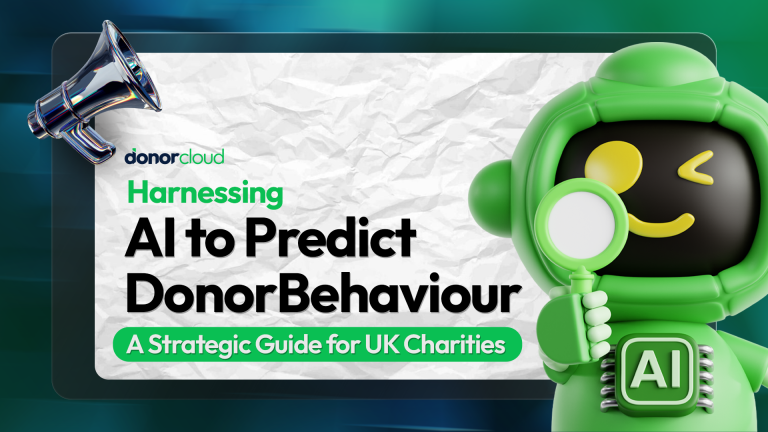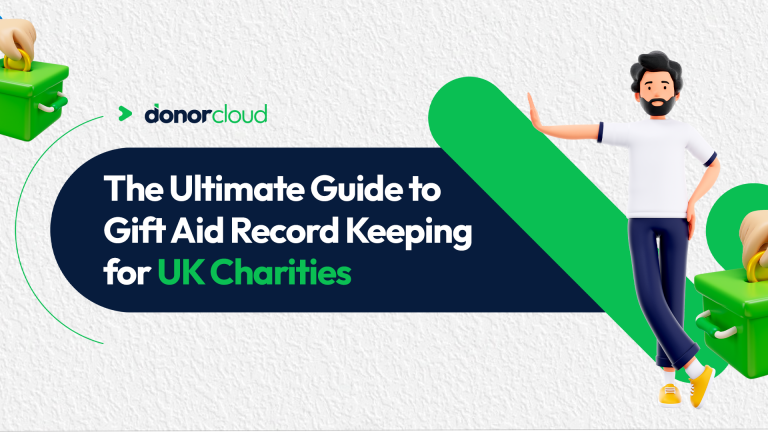Gift Aid is one of the most powerful ways for charities to increase the value of every donation they receive. But behind every successful Gift Aid claim lies one key task – proper record-keeping. Without accurate and complete records, a charity risks losing the money it could have claimed and even facing problems with HMRC.
At Donorcloud, we help charities make the process of Gift Aid management simple and stress free. In this guide, we explain everything charities need to know about Gift Aid record-keeping, what to record, how long to keep it, and the best ways to stay compliant while saving time.
Table of Contents
ToggleUnderstanding the Role of Record Keeping in Gift Aid
Gift Aid allows charities and Community Amateur Sports Clubs (CASCs) to claim an extra 25% from HMRC on eligible donations made by UK taxpayers. However, this benefit only applies when accurate records are kept.
When records are missing or incomplete, HMRC can refuse the claim. That means your charity could lose a big part of its funding. Proper record-keeping protects your charity’s income, ensures compliance, and builds trust with your donors.
At Donorcloud, we believe that record-keeping is more than a legal duty – it’s a way to make your charity’s fundraising transparent and efficient.
Key Documentation Every Charity Must Keep
Every donation under Gift Aid must have clear and traceable records. Below are the main documents that HMRC expects charities to maintain.
Gift Aid Declarations
Before a charity can claim Gift Aid, the donor must make a Gift Aid declaration. This declaration confirms that the donor is a UK taxpayer and wants the charity to reclaim tax on their donation.
Declarations can be written, verbal, or online. However, they must always include:
● The full name of the charity or CASC
● The donor’s full name
● The donor’s home address
● Whether the declaration covers past, present, and future donations or just one donation
● A clear statement that the donor wants Gift Aid to apply
● A reminder that the donor must have paid enough Income or Capital Gains Tax to cover the claim
Without this declaration, the donation is not eligible for Gift Aid.
If a donor gives a verbal declaration, the charity must send a written confirmation to the donor. The donor then has 30 days to cancel if they wish.
All declarations, written or verbal, must be kept safely.
Cancellation Records
Donors can cancel their Gift Aid declaration at any time. When this happens, the charity must record:
● The date the donor cancelled
● The method of cancellation (email, call, letter, or in person)
Any donations received after the cancellation cannot be claimed under Gift Aid unless a new declaration is made. Keeping clear cancellation records helps avoid errors and ensures HMRC compliance.
Small Donations (GASDS)
Under the Gift Aid Small Donations Scheme (GASDS), charities can claim Gift Aid on small cash or contactless donations without needing individual declarations.
Even though declarations are not required for GASDS, records are still essential. The charity must keep:
● The total amount collected
● The date of the collection
● The date money was paid into the bank
● For card donations, receipts from the machine
These records help prove that donations are genuine and eligible for the scheme.
Retention Rules and Time Limits
Gift Aid records must be kept for a specific time, depending on the type of charity and the kind of donation.
For most charities and CASCs:
● Records must be kept for six years from the end of the accounting period to which they relate.
For charitable trusts:
● Records must be kept for six years after the end of the tax year, or 12 months after the Gift Aid repayment claim for that year, whichever is later.
If a donor makes regular donations, the declaration should be kept for as long as donations continue, and then for the required six years after the final donation.
If a declaration covers multiple donations, records must be kept from the date of the last donation received under that declaration.
These time limits allow HMRC to review past claims if needed, so charities should make sure all records are easy to find and properly stored.
How to Store Records Safely
HMRC allows charities to keep records in physical or digital form. You don’t need to keep both.
● If records are stored electronically, original paper copies can be destroyed.
● For verbal declarations, a written confirmation or audio recording is acceptable.
The key is to make sure records are complete, safe, and easy to retrieve during an audit.
We at Donorcloud always recommend keeping records digitally. Our donation management system helps charities store donor information, declarations, and payment records securely in one place. This reduces errors and makes claiming Gift Aid much faster.
Creating a Clear Audit Trail
An audit trail means being able to show exactly where every donation came from and which declaration it relates to. For each donation, there must be a clear link between:
● The donor’s declaration
● The donation record
● The Gift Aid claim submitted to HMRC
For GASDS, the total collected and the date it was deposited must also be recorded.
Keeping an audit trail not only helps during HMRC reviews but also builds trust with funders and supporters who expect transparency from registered charities.
Best Practices for Efficient Gift Aid Record Keeping
Keeping Gift Aid records might sound like extra work, but with the right system, it can be simple. Here are some best practices we recommend.
Conduct Regular Reviews
Charities should review Gift Aid declarations regularly to ensure all details are correct and up to date. If a donor’s tax status changes or a declaration becomes invalid, it should be updated immediately.
Regular checks help avoid mistakes and prevent rejected claims.
Train Your Staff and Volunteers
All staff and volunteers who handle donations should understand Gift Aid basics, data protection, and how to record donor information correctly. When everyone follows the same process, your records stay consistent and accurate.
Use Smart Accounting and Donation Software
Manual record-keeping can be slow and prone to mistakes. Using software like Donorcloud makes the process easier.
Our platform lets you:
● Store Gift Aid declarations digitally
● Track donations automatically
● Generate Gift Aid claim reports for HMRC
● Keep donor data safe and compliant
By using automation, your charity saves time, reduces paperwork, and increases the accuracy of Gift Aid claims.
Stay Updated with HMRC Guidance
Gift Aid rules can change. HMRC sometimes updates declaration templates or claim rules. Charities should always stay informed about the latest guidance.
We at Donorcloud make this simple – our team regularly updates our system based on HMRC changes, so your charity always stays compliant without extra effort.
Common Mistakes Charities Should Avoid
Even well-managed charities can make small mistakes that lead to lost Gift Aid claims. Here are some common errors to watch out for:
● Missing or incomplete donor addresses
● Forgetting to record declaration cancellations
● Mixing Gift Aid and non-Gift Aid donations
● Failing to claim within the allowed time limit
● Losing verbal declaration confirmations
By following HMRC guidance and keeping all required records, your charity can claim Gift Aid smoothly and with confidence.
How Donorcloud Can Help
At Donorcloud, we know that managing donations and records can be time-consuming for charities. That’s why we’ve built tools that make Gift Aid record-keeping simple, secure, and automatic.
We help charities:
● Collect Gift Aid declarations online or in person
● Store and organise all donor data digitally
● Keep track of every donation, big or small
● Generate Gift Aid claim files ready for HMRC submission
● Access records anytime from a single dashboard
Our goal is to help you focus more on your mission and less on paperwork. With our system, you’ll never have to worry about losing data or missing deadlines again.
Final Thoughts
Gift Aid record-keeping is not just about following HMRC rules – it’s about making sure your charity gets every pound it deserves. By keeping accurate records and using the right digital tools, you can increase your income, stay compliant, and build trust with donors.
At Donorcloud, we’re here to support you at every step, from collecting Gift Aid declarations to storing data safely and submitting claims easily.





